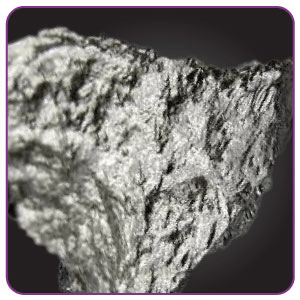
Manganese is a chemical element with the symbol Mn and atomic number 25. It is a hard, brittle, silvery-gray metal that is widely distributed in the Earth’s crust. Manganese is an essential trace element that is involved in many biological processes, including bone formation, metabolism, and the antioxidant defense system.
Manganese is commonly used in the production of steel, where it acts as a deoxidizing and desulfurizing agent. It is also used in the production of batteries, ceramics, glass, and fertilizers. Manganese compounds are used as pigments in paints and as catalysts in chemical reactions.
Exposure to high levels of manganese can be toxic to humans and can cause neurological problems, including Parkinson’s-like symptoms. Workers in industries that involve the production of manganese or manganese-containing products may be at increased risk of exposure. However, manganese is also an essential nutrient for human health, and a balanced diet should provide adequate amounts without risking toxicity.
What is Required Manganese
The required intake of manganese varies depending on factors such as age, sex, and overall health. The following are the recommended dietary allowances (RDAs) for manganese according to the National Institutes of Health (NIH):
- Infants (0-6 months): 0.003 mg/day
- Infants (7-12 months): 0.6 mg/day
- Children (1-3 years): 1.2 mg/day
- Children (4-8 years): 1.5 mg/day
- Children (9-13 years): 1.9 mg/day
- Males (14 years and older): 2.3 mg/day
- Females (14 years and older): 1.8 mg/day
- Pregnant females: 2.0 mg/day
- Lactating females: 2.6 mg/day
It is important to note that excessive intake of manganese can be harmful to health, causing symptoms such as tremors, muscle stiffness, and difficulty with coordination. It is best to obtain manganese from a balanced and varied diet, rather than relying on supplements, unless advised to do so by a healthcare professional.
Who is Required Manganese
Manganese is required by all humans, regardless of age or gender, as it is an essential nutrient that is involved in many biological processes. However, the required intake of manganese varies depending on factors such as age, sex, and overall health. Infants, children, and pregnant or lactating women have higher requirements for manganese than adults, while individuals with certain health conditions, such as malabsorption disorders, may require higher amounts of manganese to maintain healthy levels.
Manganese is particularly important for bone health, as it helps to build and maintain strong bones. It is also involved in the metabolism of carbohydrates, cholesterol, and amino acids, as well as the production of collagen, a protein that is important for healthy skin, hair, and nails. In addition, manganese plays a role in the antioxidant defense system, helping to protect cells from damage caused by free radicals.
When is Required Manganese
Manganese is required by the body at all times, as it is an essential nutrient that is involved in many biological processes. However, the amount of manganese required may vary depending on factors such as age, sex, and overall health.
During infancy, children require higher levels of manganese to support growth and development. Pregnant and lactating women also have increased requirements for manganese to support fetal and infant growth and development.
Throughout adulthood, manganese continues to play important roles in various biological processes. It is important for maintaining healthy bone structure and density, as well as for the proper metabolism of carbohydrates, cholesterol, and amino acids. Additionally, manganese is involved in the antioxidant defense system, helping to protect cells from oxidative stress and damage caused by free radicals.
It is important to obtain manganese through a balanced and varied diet, as excessive intake of manganese can be harmful to health. Foods rich in manganese include nuts, seeds, whole grains, legumes, green leafy vegetables, and tea.
Where is Required Manganese
Manganese is found in a variety of foods, including plant-based foods such as nuts, seeds, whole grains, legumes, green leafy vegetables, and tea, as well as in animal-based foods such as seafood, poultry, and lean meats.
Here are some examples of foods that are good sources of manganese:
- Nuts: almonds, pecans, walnuts, hazelnuts
- Seeds: pumpkin seeds, sesame seeds, flaxseeds, chia seeds
- Whole grains: brown rice, oatmeal, quinoa, whole wheat bread
- Legumes: chickpeas, lentils, black beans, kidney beans
- Green leafy vegetables: spinach, kale, collard greens, Swiss chard
- Tea: black tea, green tea
- Seafood: mussels, clams, shrimp
- Poultry: chicken, turkey
- Lean meats: beef, pork, lamb
The amount of manganese in foods can vary depending on factors such as soil quality, agricultural practices, and food processing methods. Therefore, it is important to consume a varied and balanced diet to ensure adequate intake of manganese and other essential nutrients.
How is Required Manganese
Manganese is absorbed through the small intestine and transported to various organs and tissues, where it is involved in many biological processes. The absorption of manganese can be influenced by various factors, including dietary factors, gut health, and the presence of other nutrients.
Manganese is absorbed in the small intestine by both passive diffusion and active transport, and its absorption is influenced by dietary factors such as the presence of phytic acid, fiber, and calcium. Phytic acid, which is found in whole grains, legumes, and nuts, can bind to manganese and reduce its absorption. Fiber can also bind to manganese, but it may increase its absorption by increasing gut motility. Calcium can inhibit manganese absorption, but this effect is small and can be compensated for by increasing the intake of manganese-rich foods.
Once absorbed, manganese is transported to various organs and tissues, including the liver, pancreas, and bone. It is involved in many biological processes, including bone formation, metabolism, and the antioxidant defense system. Manganese is excreted mainly in the feces, with a smaller amount excreted in the urine.
It is important to obtain manganese through a balanced and varied diet, as excessive intake of manganese can be harmful to health. The recommended intake of manganese can vary depending on factors such as age, sex, and overall health, and should be obtained through a combination of dietary sources and, if necessary, supplements.
Case Study on Manganese
Here is a case study on the role of manganese in health:
Case: Mary is a 60-year-old woman who has been experiencing joint pain and stiffness for several months. She has a history of osteoporosis and is concerned about her bone health. Her doctor orders blood tests, which show low levels of manganese.
Discussion: Manganese is an essential nutrient that is important for bone health, as well as many other biological processes. Low levels of manganese can lead to a variety of symptoms, including joint pain and stiffness, as well as poor bone health.
Mary’s low manganese levels may be due to a variety of factors, including inadequate dietary intake, malabsorption disorders, or medications that interfere with manganese absorption. Her history of osteoporosis may also indicate a higher need for manganese, as it plays a key role in bone formation and maintenance.
To address Mary’s low manganese levels and support her bone health, her doctor may recommend increasing her intake of manganese-rich foods, such as nuts, seeds, whole grains, legumes, green leafy vegetables, and tea. If necessary, a manganese supplement may also be recommended to help meet her needs.
It is important to note that excessive intake of manganese can also be harmful to health, as it can lead to neurological symptoms such as tremors, muscle rigidity, and cognitive impairment. Therefore, it is important to obtain manganese through a balanced and varied diet and to follow recommended intake levels.
White paper on Manganese
Here is a white paper on manganese:
Introduction
Manganese is an essential nutrient that is involved in many biological processes in the body. It plays a key role in bone health, metabolism, and the antioxidant defense system. Manganese deficiency can lead to a variety of symptoms, including joint pain, poor bone health, and impaired glucose tolerance. However, excessive intake of manganese can also be harmful to health, as it can lead to neurological symptoms such as tremors and cognitive impairment.
Sources of Manganese
Manganese is found in a variety of foods, including plant-based foods such as nuts, seeds, whole grains, legumes, green leafy vegetables, and tea, as well as in animal-based foods such as seafood, poultry, and lean meats. The amount of manganese in foods can vary depending on factors such as soil quality, agricultural practices, and food processing methods. Therefore, it is important to consume a varied and balanced diet to ensure adequate intake of manganese and other essential nutrients.
Role of Manganese in Health
Manganese is involved in many biological processes in the body, including bone formation and maintenance, metabolism, and the antioxidant defense system. Manganese plays a key role in the synthesis of collagen, a protein that is essential for bone health. Manganese also helps to metabolize carbohydrates, cholesterol, and amino acids, and is involved in the production of certain enzymes that are necessary for these processes.
In addition, manganese is involved in the antioxidant defense system, helping to protect cells from oxidative stress and damage caused by free radicals. Manganese is a cofactor for the enzyme superoxide dismutase, which converts superoxide radicals to less harmful forms, thereby reducing oxidative damage.
Manganese Deficiency
Manganese deficiency can lead to a variety of symptoms, including joint pain and stiffness, poor bone health, and impaired glucose tolerance. Manganese deficiency may be more common in individuals who consume a diet that is low in manganese, such as those who consume highly processed foods or those with certain medical conditions that affect manganese absorption or utilization.
Excessive Manganese Intake
Excessive intake of manganese can also be harmful to health, as it can lead to neurological symptoms such as tremors, muscle rigidity, and cognitive impairment. Excessive intake of manganese is rare in individuals who consume a balanced diet, but may occur in individuals who consume high amounts of certain dietary supplements or industrial sources of manganese.
Conclusion
Manganese is an essential nutrient that is involved in many biological processes in the body. Adequate intake of manganese through a balanced and varied diet is important for maintaining optimal health. However, excessive intake of manganese can also be harmful to health, and it is important to follow recommended intake levels. Further research is needed to better understand the optimal intake of manganese for different populations and to identify potential risks associated with excessive intake.
